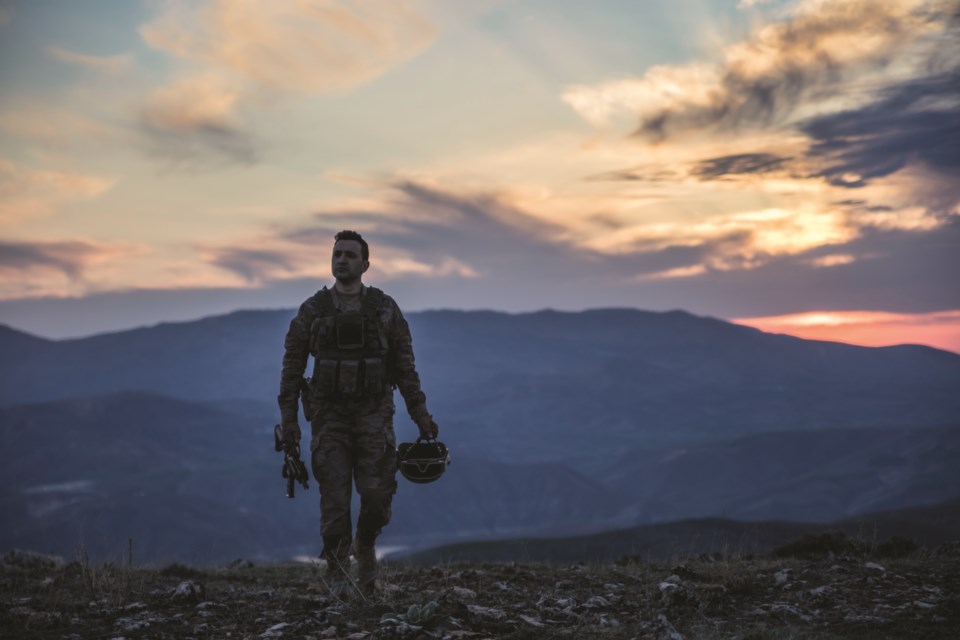“There is a nice sound to the phrase ‘mountain warfare.’ It has a ring of daring; it sounds cleaner than trench warfare and lighter than tank warfare. The only thing that can match it is the war in the air, and that has become too deadly to be nice any more. It has also become too familiar; while war in the mountains is still strange enough to sound romantic. Except, of course, to the men who have to fight it.”
- McKay Jenkins, The Last Ridge
Like many of you, over the past week I’ve been in shock watching Russia’s invasion of Ukraine. Just when we think we’ve seen enough generation-defining world events to last us for the next century, Putin decides to flex his imperialist muscle and plunges two nations—one a military superpower—into an unprovoked and unnecessary war. Let’s be clear: there’s no freedom convoy division, lets-try-to-listen-to-both-sides argument here. There’s the belligerent in the Kremlin on one side and on the other, thousands of soldiers and civilians defending their homeland. Millions of people are now displaced. The world stands with Ukraine. I stand with Ukraine.
I’m no military man, and I’m lucky enough that I haven’t experienced war. I do like to study military history as a bit of a hobby, which leads to many hours listening to Dan Carlin podcasts. I’ve never believed war is the answer, but if it comes to your doorstep and threatens your family and country (as it has for the Ukrainians), I believe defence of one’s homeland is justified.
Such an event on this scale taking place in the 21st century got me thinking: what if it was us being invaded at the behest of a narcissistic autocrat? It’s a scenario highly unlikely given Canada’s fortuitous geo-political position, but dystopian fiction writers have explored the plausibility of annexation from the United States. So let’s imagine, for a second, that in the middle of a cold winter, Canada was invaded on several fronts by armed forces far superior to our own and Canada’s leader called on every person of fighting age to take up arms against the aggressor.
If this scenario were to come to pass, I would volunteer for a Mountain Division. Not because of any delusion that ski warfare would somehow be more fun than urban warfare, but because I know I have the skills to travel across snow and through mountainous terrain relatively quickly.
Military skiing has a rich history in the Scandinavian nations. In 1716, during the Great Northern War, a Norwegian general was alerted of an imminent Swedish attack by a messenger on skis. After surprising the Swedes and repelling the attack, Norway realized the advantage of quick mobilization on snow and enlisted every skier they could find into their military ranks. In the 1800s, Nordic military ski patrols began to organize competitions which led to the foundation of modern Nordic ski racing. The ability to travel quickly over rugged mountain terrain was essential to the armies in the European Alps in the 20th century.
In the context of skiing soldiers defending against a superpower, the best example is the Winter War, which began with the Soviet invasion of Finland on November 30, 1939, three months after the outbreak of the Second World War. The Finns were vastly outnumbered and under-resourced, with many recently enlisted soldiers not even having uniforms and making do with their own winter clothing. But they knew their terrain and their climate and almost all Finnish soldiers were skilled in cross-country skiing. They used the cold, snow, forest, and long hours of darkness to their advantage. The Finns dressed in layers with ski troopers donned in lightweight white snow capes, the camouflage making them almost invisible and able to execute many successful guerrilla attacks against Soviet columns.
The U.S. has the 10th Mountain Division, which was active during the Second World War and still served recently as a dedicated mountain warfare unit in places such as Iraq and Syria. While special operation training programs for mountain travel exist in Canada, the armed forces still do not have a dedicated mountain unit, at least not one they want us to know about. In a 2017 service paper titled “Mountain Warfare In The Canadian Army,” Canadian Forces College student Maj Aafaq Hyder wrote:
“The [Canadian Army]’s recent involvement in the alpine operations in Korea, the Balkans and in Afghanistan has highlighted the importance of preparing its leaders and troops for [Mountain Warfare] and combat in high altitude. Currently, the [Canadian Army] has limited focus to prepare standing units specially trained or equipped to deploy to a mountainous theatre. To remain operationally viable and meet its military commitments to North Atlantic Treaty Organisation (NATO), the [Canadian Army] needs to develop proficiency in mountain operations. It needs to carve out a niche for itself as an expeditionary force capable of rapid response in [Mountain Warfare].”
Of all the things I associate with skiing, war has never been one of them. And I sincerely hope war never comes to Canada’s doorstep. But if the last week has shown us all one thing, it’s that the tyrants of this world might just choose to wage it anyway.
Vince Shuley encourages you to donate to the Red Cross Ukraine Humanitarian Crisis Appeal. For questions, comments or suggestions for The Outsider email [email protected] or Instagram @whis_vince.




